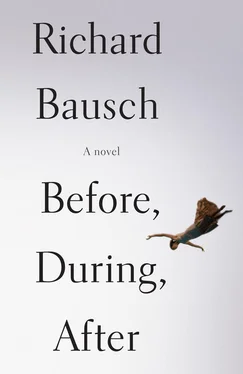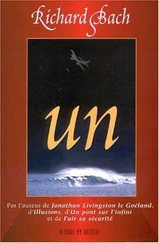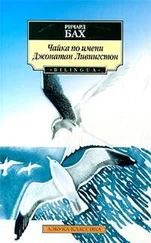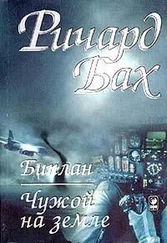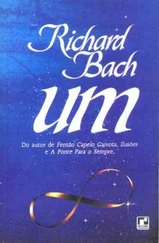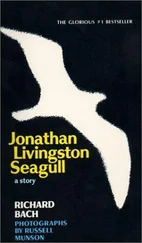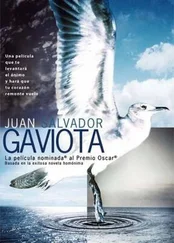“I did not mean to hurt you.” He seemed incredulous. “It made me mad when you kicked me. We were together on the beautiful beach, you and me.” He turned and looked behind him and then moved to the next door down — Constance’s room.
Natasha got her door open, scrabbled inside, and closed it. She set the ashtray trash can down with a loud metallic thud, and fumbled with the chain lock. She couldn’t get it, couldn’t make it work, but a moment later, just in time it seemed, she got the dead bolt to click into its socket.
His voice came, too loud, from the other side. “I do not take what is not given. It was ours.”
She put her ear to the wood, listening for a moment, and when she peered through the peephole she saw that he was still there, head down, one hand out leaning on the frame of the door. “Oh, please go,” she said, with a loud whimpering cry. “Please. I won’t say anything. Just please. Please leave me alone.”
Nothing. She waited, afraid to look. The nausea was returning. She went to the window and looked out at the light on the water. Back at the door, she put her eye to the peephole, and, seeing the long prospect of the empty hallway, turned around and sank slowly to a sitting position, knees up, crying and retching drily while the night breezes came in. The air itself felt dirty, stained. Time went away while she half lay there. It might have been hours. The hands of the clock were dead. Finally she made her way into the bathroom and ran the water, all the water — hot and cold, in the sink and in the bathtub. She tore the clothes off herself and threw them to the floor, shuddering, but then gathered them and put them in a plastic bag and stuffed the bag into the trash can that was still by the door. In the bathroom, avoiding the sight of herself in the mirror, she got into the tub and plugged it with the shiny metal lever, then sat down in the hot water and watched the swirls of it, blood streaked, at her ankles. When the water was near the middle of her calves, she turned the spigot off and unplugged the tub and let it all run out. Then she reseated the plug, adjusting the water so that it was even hotter. She soaked a washrag and put soap on it and went over herself, crying and scrubbing, hurting.
All this time the spigot in the sink was running, too. The room was steaming up. She stood up in the soapy water of the tub and turned the shower on. The shower water was losing its heat, but she remained under it, letting the stream of it run down her body. There was so much sand in her hair. She washed it, stood, head back, under the flow. The mirror and the window were a blank fog. The steam rose and curled about her. She turned the water off, thinking of fire and death. The attacks in the far-off cities of home.
Oh, yes. That .
She could not get clean. There was not enough water in the world.
1
He might’ve slept. He had a moment of believing himself to be home, then realized that this trip was not taking him home. It had felt like mind wandering, but he understood now that it had been dreaming and that he had been asleep. He sat forward and looked out into the moving-by of the houses and streets and fields. The train was coming into what he thought was Washington, but it was Baltimore. It slowed and rocked and clanked, and now the platform came into view, the light there making a wide white bell shape in the dark. When the train stopped, through the rising steam and dust from the wheels, he saw the Asian boy get off. The boy went by the window and glanced at him and hesitated, then tentatively held up one hand for a few seconds. All his heartbreak was in the gesture, and he was someone moving through the most terrible hours of his young life, being determinedly decent, going on away.
Michael Faulk looked at the station platform. The light sputtered, threatened to go out, some momentary drain of power. A lone figure, a man in a hooded sweatshirt, wandered out of the dimness and took a seat on a bench by the wall, arms folded, face in the deep gloom of the hood he wore. The man’s shadow went out from him. Faulk thought of the people of his country, personified in the Asian boy’s last gesture and in this image of a man sitting alone in unsteady light. The train had come, as trains do, into the station. Things would go on. And yet it all felt broken. He had left the priesthood.
Finally the train rocked into motion. He sat back in the seat and tried to sleep, and couldn’t. He thought of Natasha, so young and so far away. He hoped that somehow she had got in touch with Aunt Clara. He did not want to think of her worrying about him.
Washington looked unchanged. He tried to peer into it as the train neared Union Station. He did not know what he might find, but it felt important to watch for some essential difference, whatever that might be: cordoned-off streets or police flashes, more light in the neighborhoods. But there wasn’t much to see except the other rails with their dull strand of sheen, paralleling the track he was on, and, beyond that, the city’s businesses and the monuments, the neighborhoods, flickers of brightness in many windows, and then small vistas of avenues and the darker shadows of trees in the streetlamps. The angle wasn’t right to see the Washington Monument, but the Capitol dome was visible, glowing somehow with greater dignity in soft white light. When the train stopped it seemed to give a last shudder, as though sighing with weariness. He hurried out of the car and up the stairs to the main level. All the lights were on, and a few passengers walked behind and in front of him. It was very quiet. No one was saying anything to anyone else. Every sound carried hollowly — footsteps, baggage being pulled along, the small clatter of the cleaning and restocking of shelves by quiet workers. It all reverberated in the cavernous height of the ceiling. A few men and women were lined up at the ticket counter. No one seemed to be with anyone. Most of the restaurants and shops were barred and closed. Several people — it looked like a family — were ranged among the benches at one gate, amid suitcases and cartons of food and blankets they’d obviously retrieved from their bags. The man and his wife and a young boy were asleep. A girl in her early teens slouched on the shoulder of the sleeping woman, reading a book. She stared glumly, almost warily, at Faulk as he crossed in front of her, headed for the front entrance.
Out in the circular road at the front, the flags were at half-staff. He had never really looked at them before. A warm breeze blew. It was a humid night. Cabs were parked along the curb. He got into the first one and gave the driver Aunt Clara’s address.
The driver was a young man with large black eyes under thick black brows in a narrow, bony face — he looked like someone who had spent all day studying and whose mind was elsewhere.
He pulled out in traffic, and for a little space Faulk gazed at the back of his head, watching him negotiate the crowded lanes with a measure of aggressiveness, muttering low at other cars, attending to everything as if he were alone. At length, Faulk sat back, determined to ignore him. He saw the shifting views of the street and the other people in the cars they passed. Massachusetts Avenue. A couple in one car was laughing at something, the woman gesturing and nodding, the man holding up one hand as if in surrender.
How could anyone find a way back to lightheartedness?
This abysmal day had brought everything of normal life into question. What could be left of banter, jokes, silliness? He knew that this thought was irrational and that people would go on being people. Long ago he had learned to cultivate a healthy distrust of his own thinking when he was in the grip of anxiety.
Читать дальше
